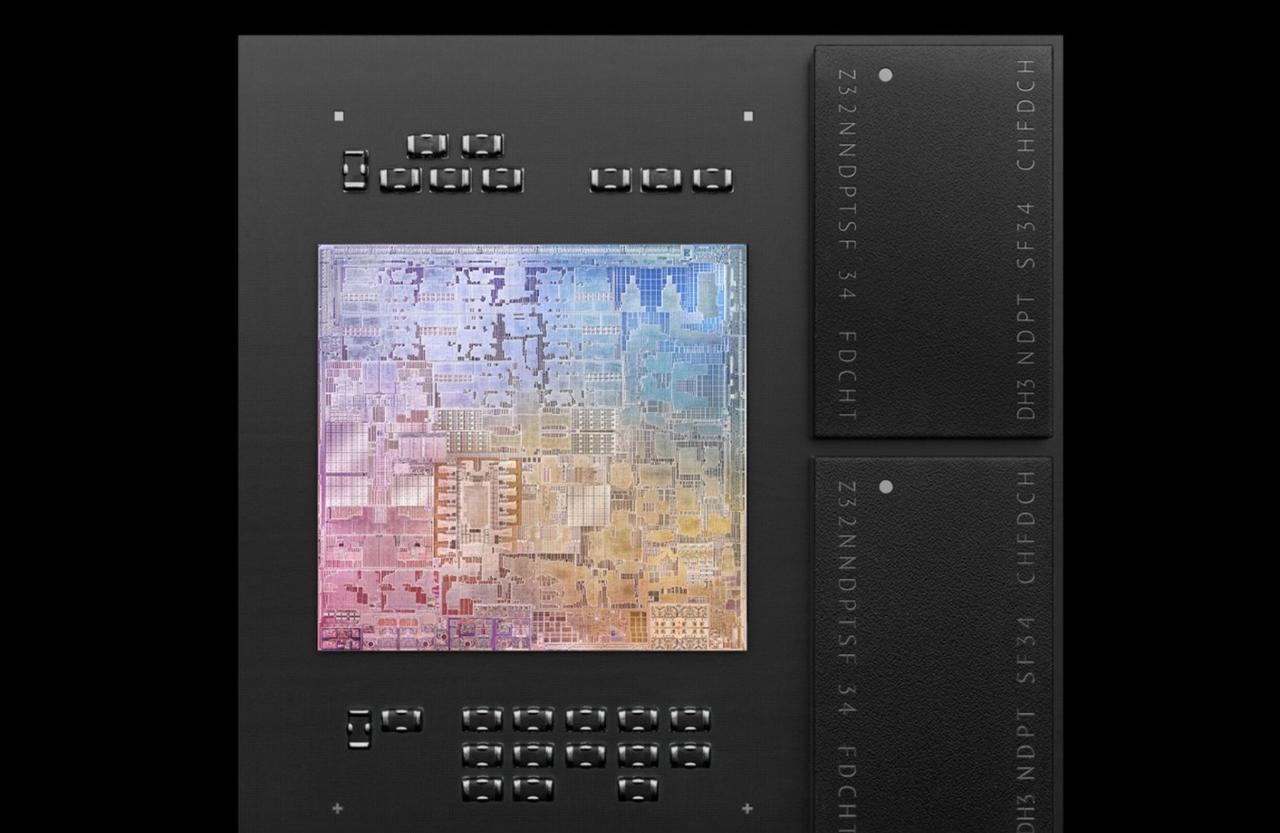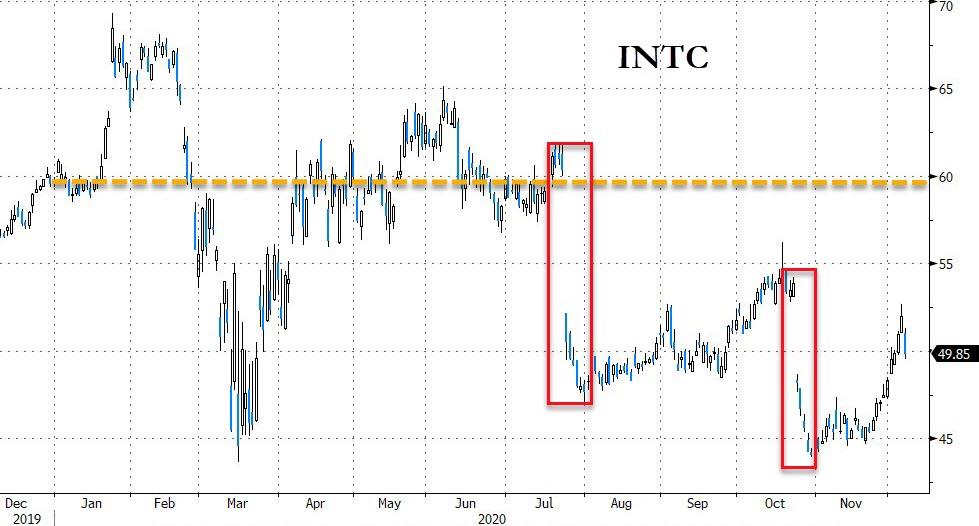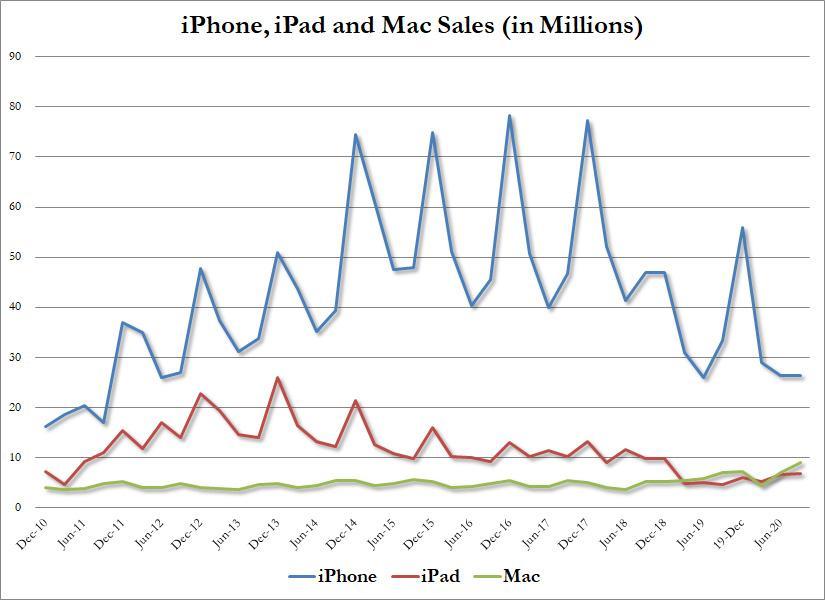A Terrible Year For Intel Just Got Worse: Apple Plans Powerful Next-Gen Custom Chips
Intel has had a difficult year as a wave of consolidation in the semis space has stoked fears that the once-dominant American firm (which was a once universally acknowledged as the global leader in processor-speed innovations) might lose its grip as Nvidia buys Arm in what's been heralded as "the largest semiconductor deal ever".
INTC was riding high as recently as 2018 when geopolitical entanglements stopped two proposed deals involving rival chipmaker Qualcomm QCOM. To be sure, the deals announced this year involving Nvidia, Arm, AMD and Xilinx will have more of an impact on industries like defense and the burgeoning "Internet of Things". But Apple's decision to start designing its own chips is shaping up to be a game-changer, at least as far as PCs are concerned.

According to Bloomberg, Apple AAPL is developing a second-generation of chips which, thanks in part to technology licensed from ARM, might soon surpass Intel in terms of sheer processing power, giving Apple a potential leg up as it seeks to boost its share of the PC market.
Intel shares tumbled on Monday, breaking a streak of strong performance inspired in part by Intel's new partnership with Amazon AMZN.
(Click on image to enlarge)

Like all of Apple's other products, its chip designs are also farmed out to manufactured in foundaries owned by a third party - in this case, Taiwan Semiconductor Manufacturing Company, the world's largest maker of customer designs.
Less than a month ago, Apple introduced the "M1", its first processor, which runs on an ARM-based system (but was designed by Apple engineers).
If Apple's chips live up to expectations, they could help Apple bolster its PC business by building laptops and desktops that can outperform all but the most powerful personal computers.
What's more, Apple might be ready with this next generation sooner than investors previously believed. The company's next series of chips could debut as early as the spring, and they could be included in upgraded versions of the MacBook Pro, including both entry-level and high-end iMac desktops, and, later on, a new Mac Pro workstation.
The news is the latest indication that Apple is planning nothing short of the full-scale eradication of Intel's chips from all of its products, from laptops to the iPad, iPhone, and even the company's most powerful desktops.
The road map indicates Apple’s confidence that it can differentiate its products on the strength of its own engineering and is taking decisive steps to design Intel components out of its devices. The next two lines of Apple chips are also planned to be more ambitious than some industry watchers expected for next year. The company said it expects to finish the transition away from Intel and to its own silicon in 2022.
Bloomberg summed up the benefits for Apple thusly: the move sheds that dependency, deepens its distinction from the rest of the PC market, and gives it a chance to add to its small, but growing share in PCs. Looking further into the future, Apple engineers are developing more ambitious graphics processors. While the current generation of Apple's M1 processors are offered with a custom Apple graphics engine that comes in either 7- or 8-core variations, the company's future high-end laptops, and mid-range desktops could feature 16-core and 32-core graphics parts built by Apple.
For later in 2021 or potentially 2022, Apple is even planning 64 and 128 dedicated core chips to be featured in its most high-end machines. Those graphics chips would be several times faster than the current graphics modules Apple uses from Nvidia and AMD in its Intel-powered hardware.
As iPhone sales have slowed over the past few years, Apple CEO Tim Cook has been pitching the company's services business as the new locus of revenue growth for the world's most valuable company. Despite this, Apple has served up optimistic forecasts for the current generation of iPhones, arguing that the upgrade to 5G could inspire an upgrade "supercycle". Of course, analysts and even some of the major carriers like AT&T have poured cold water on these hopes.
(Click on image to enlarge)

If nothing else, the news about Apple's microchip ambitions offer one more potential growth area to help the world's most valuable company avoid relying too heavily on a single business line - like, say, iPhone sales - for future revenue and bottom-line growth.
Disclaimer: Copyright ©2009-2020 ZeroHedge.com/ABC Media, LTD; All Rights Reserved. Zero Hedge is intended for Mature Audiences. Familiarize yourself with our legal and use policies every time ...
more


